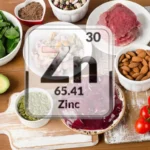Table of Contents
Discover 7 Surprising Magnesium Benefits You Don’t Know that you might not know! Learn how this essential mineral boosts energy, manages stress, supports heart health, and more
Incorporating magnesium into your daily routine, whether through diet or supplementation, can provide significant health benefits. For specific recommendations and to ensure safe levels of intake, always consult with a healthcare professional.
Magnesium explained
Magnesium is a fascinating mineral .
It’s involved in over 350 different enzymes in the body , and we may find that it’s involved in a lot more .
But what’s interesting about enzymes is that they speed up the chemical reactions in the body of a factor of like a 100000000 times faster than if you didn’t have that enzyme .
There’s definitely things that you know .
It helps with heart disease .
It helps with cramping at night .
If you have those cramps in your calves , it helps you sleep .
It’s involved in helping you reduce anxiety .
It makes you more relaxed .
It actually makes your arteries less stiff .
And that’s going to help you lower blood pressure .
Well-known magnesium benefits
You probably also know that magnesium works with calcium is kind of like a teeter totter effect .
The more calcium you have , the less magnesium you’re going to have , and vice versa .
So you need calcium and magnesium in the right ratios , especially involved in the muscle contraction and relaxation .

So where calcium tends to be involved in contraction , magnesium is all about relaxation .
And this is why you have all sorts of muscle problems if you have a deficiency in magnesium , like a cramp , like , twitching , like tetany .
A lot of times people take magnesium because they have headaches .
So magnesium is good for headaches .
And so if there’s any problem involving with the nerve and muscle , irritation or even arrhythmias in the heart , think magnesium .
But let’s talk about the things that you probably have never heard about that are quite interesting .
There’s an enzyme that helps you regulate cholesterol .
It’s called HMG CoA Reductase .
This is the enzyme that statins work on , and it just so happens that magnesium parallels the effects of statin .
Surprising benefits of magnesium
So it can help you regulate LDL or an increased HDL , and help you regulate your triglycerides as well .
Magnesium is also involved in enzymes related to lecithin , which is like the antidote to cholesterol .

And so without magnesium , you’re gonna have a lot of issues with cholesterol and the ratios , as well as having lecithin work .
Now the other big thing that magnesium is involved with is making ATP .
That is the energy currency of the body , and without that , you just can’t make energy .
So this is why magnesium is the 2nd most needed mineral in the body just behind potassium .
So without magnesium , you could be tired all the time .
Now the other thing about magnesium is that it can help you lower adrenaline , cortisol , and something called ACTH .
ACTH is this , hormone that is released from the pituitary that tells the adrenals to release cortisol .
And so if you have less regulation on that hormone , you’re gonna have higher levels of stress .

And this is why magnesium is really good for stress and anxiety because it helps to normalize this ACTH , cortisol , and adrenaline , as well as help to counter all the oxidative stress that comes with these stress hormones .
So magnesium is very protective at the cellular level .
Magnesium is a natural calcium channel blocker because it opposes calcium , which means it’s really good for blood pressure .
But , typically , they don’t know why .
Well , the reason is this .
It can act like a natural calcium channel blocker .
Calcium channel blockers are a common medication for hypertension .
Well , magnesium is a natural version of that with virtually no side effects , but it also can act at the same time as a beta blocker .

So with one angle , it helps balance calcium , and from another angle , the beta blocker that has to do with reducing stress in the arteries and that whole system .
Now a couple other really cool things that magnesium is involved with .
Number 1 , it’s in natural antithrombotic .
Basically , it’s a natural blood thinner .
Another thing you may not know about magnesium is that it can help you lower your blood sugars .
It is really important in kind of undoing insulin resistance .
And the last thing , which is actually probably the most important function of magnesium , magnesium is involved in making DNA without having the perfect blueprints that can create a huge chain reaction .
And And we typically need about 310 to about 420 milligrams of magnesium every day , and not a lot of people get that .
And so they’re gonna be deficient , and they’re gonna have these problems .
Magnesium is at the heart of chlorophyll .
So anything green , like dark leafy green vegetables , and this is something that a lot of people don’t consume .
The best source of magnesium
But then you also have nuts and pumpkin seeds , dark chocolate , of course , without the sugar , sea kelp , and even certain types of sea salt that are low sodium type sea salt .
But we also have to look at those things that are depleting our magnesium .
Top things that deplete magnesium
Refined sugars , refined carbohydrates , alcohol , diuretics , diarrhea , having a low stomach acid , and even having certain type of gene variations .
That can also be a problem .
It’s actually quite common where people just don’t seem to absorb magnesium like they should .
And And for those people , it’s even more important to stay away from alcohol and things that deplete your magnesium , and and even probably supplement with a good form of magnesium .
And the type of magnesium I would recommend is magnesium glycinate , which is very bioavailable .
Now since we’re on this interesting topic of magnesium
Key Points:
Magnesium is a fascinating and important mineral that’s involved in over 350 enzymes in the body. Enzymes speed up the chemical reactions in the body, and they don’t deplete their energy in the process.
Well-known benefits of magnesium:
• It supports the heart
• It may help with muscle cramping
• It supports sleep
• It may help reduce anxiety
• It may help promote relaxation
• It supports the flexibility of the arteries
• It may help with headaches
• It may help with problems related to the nerves and muscles
Surprising benefits of magnesium:
- It may help regulate LDL cholesterol and triglycerides and increase HDL
- It helps make ATP (energy in the body)
- It helps regulate adrenaline, cortisol, and ACTH—and counters oxidative stress from these hormones
- It’s involved in enzymes related to lecithin (the antidote to cholesterol)
- It’s a natural calcium channel blocker, beta blocker, and antithrombotic
- It helps regulate blood sugar levels
- It’s involved in making DNA
Many people don’t consume enough magnesium, which can cause a magnesium deficiency and lead to various health issues.
Magnesium-rich foods:
• Foods high in chlorophyll (dark leafy green vegetables)
• Nuts and pumpkin seeds
• Dark chocolate (sugar-free)
• Sea kelp
• Avocado
• Low-sodium sea salt
Here are the top things that can cause you to become magnesium deficient:
• Refined sugar and refined carbs
• Alcohol
• Diuretics
• Diarrhea
• Low stomach acid
• Certain gene variations
The type of magnesium supplement I would take, if needed, is magnesium glycinate.
DATA:
https://pubmed.ncbi.nlm.nih.gov/15466951
https://www.ncbi.nlm.nih.gov/books/NBK507250
FAQ:
What are the miracle benefits of magnesium?
Magnesium is often hailed for its extensive health benefits, including:
- Supporting Muscle and Nerve Function: Essential for muscle relaxation and nervous system regulation.
- Enhancing Heart Health: Magnesium helps maintain a healthy heartbeat and is linked to lower blood pressure.
- Promoting Mental Well-being: It can reduce symptoms of anxiety and depression, contributing to better mental health.
- Bone Health: Magnesium plays a crucial role in bone formation and maintaining bone density.
- Regulating Blood Sugar: Important for insulin metabolism, magnesium can help control blood sugar levels, beneficial for those with diabetes.
- Improving Sleep: Magnesium supplementation can enhance sleep quality by regulating neurotransmitters involved in sleep.
How do you get 100% of magnesium daily?
To meet your daily magnesium requirements, include various magnesium-rich foods in your diet. Some excellent sources are:
- Nuts and seeds (pumpkin seeds, almonds, cashews)
- Whole grains (quinoa, brown rice)
- Leafy green vegetables (spinach, kale)
- Legumes (black beans, lentils)
- Dark chocolate and avocados
Dietary intake can be complemented with supplements, especially if you’re at risk of deficiency. However, consultation with a healthcare provider is recommended before starting supplements.
What drink is high in magnesium?
Mineral water, particularly those labeled as “hard” water, can be a good source of magnesium. Other magnesium-rich beverages include fortified plant-based milks, like almond or soy milk, which often have magnesium added to them.
What I noticed after taking magnesium?
Individual experiences vary, but many report the following after starting magnesium supplementation:
- Decreased muscle cramps and twitches
- Improved sleep quality
- Reduced anxiety and enhanced mood
- Lower blood pressure and better heart health
What is the healing power of magnesium?
Magnesium’s healing power lies in its essential role in hundreds of biochemical reactions in the body. It aids in:
- Muscle and nerve function: Assisting in relaxation and reducing cramps.
- Bone health: Contributing to stronger bones and preventing osteoporosis.
- Cardiovascular health: Lowering the risk of heart disease.
- Stress reduction: Acting as a natural tranquilizer, helping to alleviate stress and anxiety.
How long does it take to see benefits of magnesium?
The timeline to experience the benefits of magnesium can vary. Some may notice improvements in sleep and muscle relaxation within days, while other benefits, like enhanced bone health or better blood sugar regulation, may take longer—typically a few weeks to months of consistent supplementation.
What diseases does magnesium help with?
Magnesium supplementation has been associated with prevention or management of several conditions, including:
- Cardiovascular diseases: By improving heart health and lowering blood pressure.
- Type 2 diabetes: Through better insulin and blood sugar regulation.
- Migraines: Magnesium may reduce the frequency and severity of migraines.
- Osteoporosis: By contributing to stronger bone density.
- Depression and anxiety: Offering potential mood-regulating benefits.
Why does magnesium make me feel so good?
Magnesium contributes to increased production of serotonin, a neurotransmitter responsible for mood elevation and happiness. Additionally, by supporting muscle relaxation and improving sleep quality, magnesium can enhance overall well-being, making you feel revitalized and more balanced.




